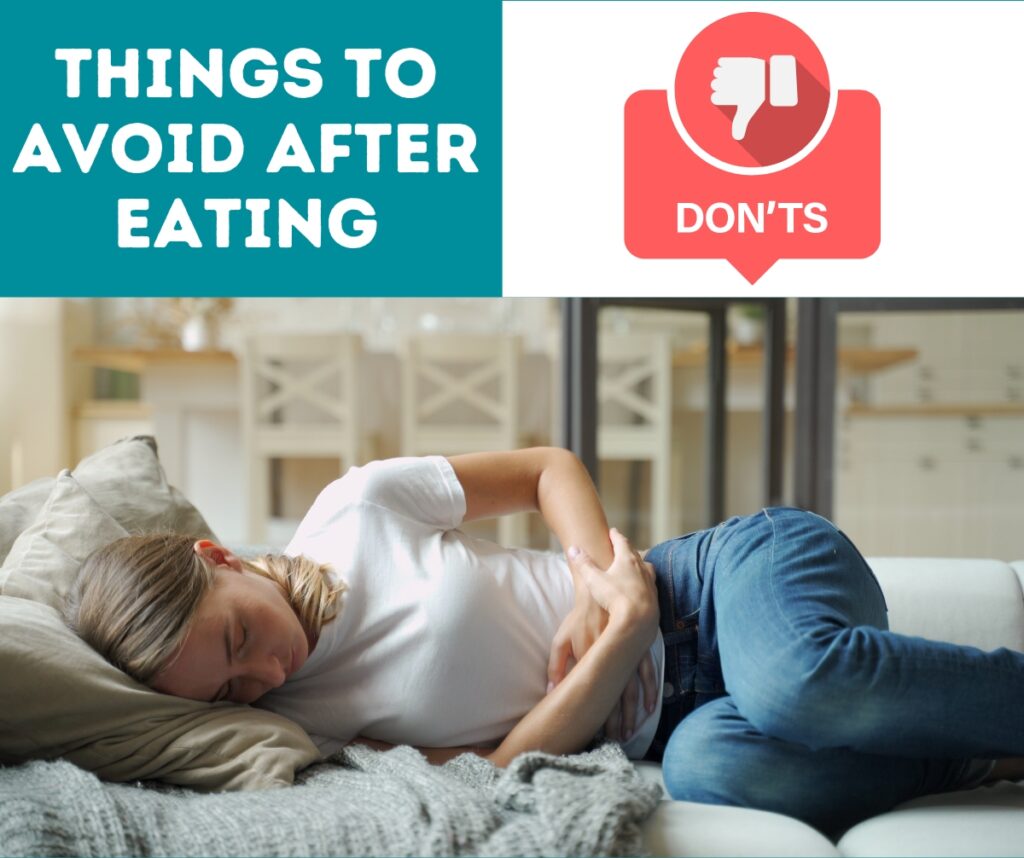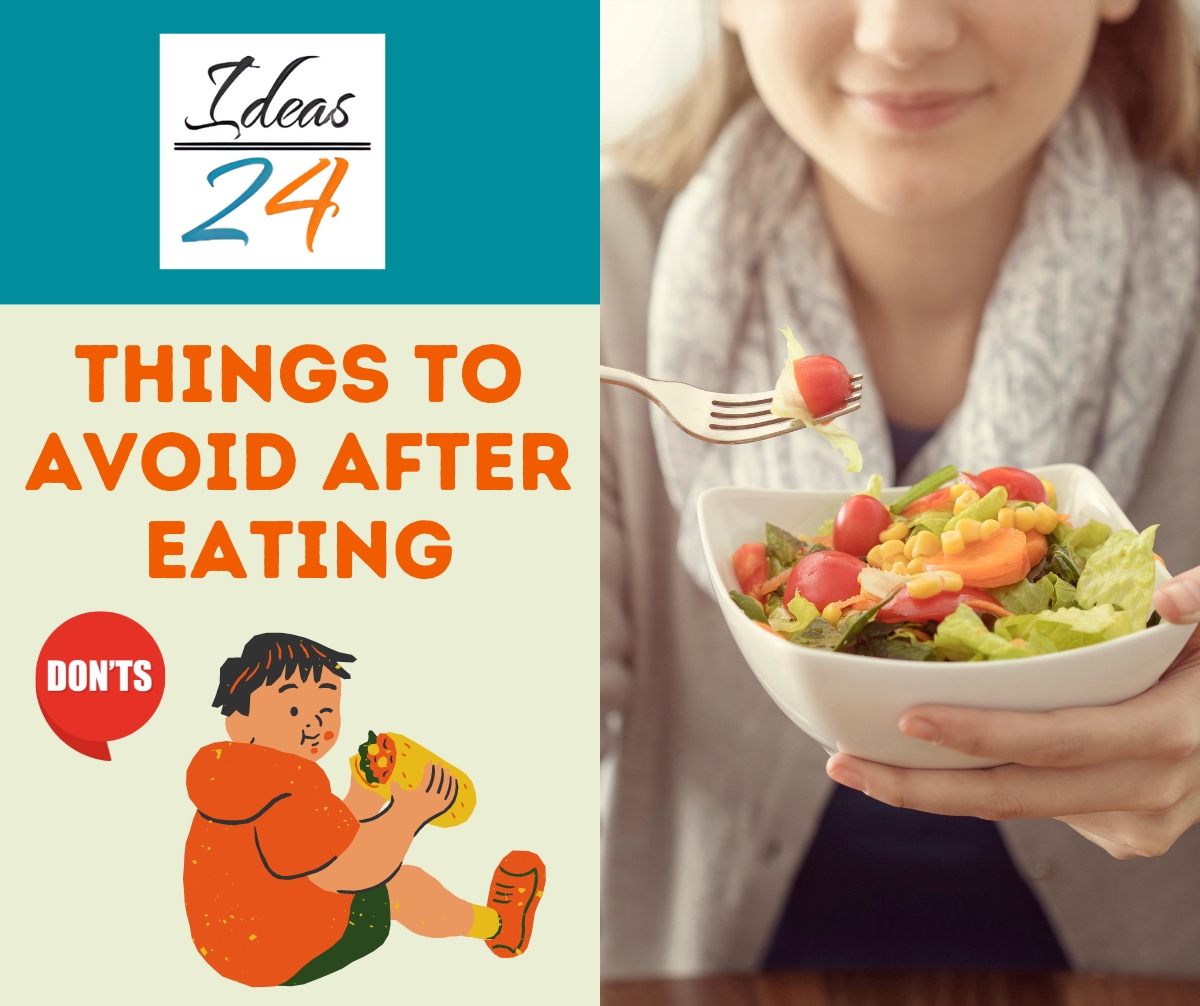What are the things to avoid after eating? In today’s fast-paced world, we often overlook the small habits that can significantly impact our health and well-being.

Feasting is more than just a mean to satiate hunger; it’s a holistic experience that feeds both the physical and spiritual aspects of our being.
However, the actions we take immediately following a meal can significantly influence the nourishment we derive from our food.
What Are The Things to Avoid After Eating?
Right after we finish a meal, our body kicks into high gear to digest and absorb the nutrients. It’s a critical time when certain activities can hinder this process, leading to discomfort and long-term health issues.
Here are the top things to avoid after eating:
1. Don’t Rush to Lie Down
The urge to lie down after a hearty meal is natural, but it’s a temptation best resisted. Reclining too soon can lead to discomfort and indigestion. It is because as the gravitational aid in keeping stomach contents in place is lost, potentially causing acid reflux or heartburn.
Taking a nap right after eating can disrupt the digestive process, leading to bloating and discomfort. It’s advisable to stay upright and active for a while to ensure your meal is well on its way through the digestive tract before you consider resting.

Health professionals advise waiting at least two to three hours before lying down, allowing the body ample time to initiate the digestive process efficiently.
Creating a habit of taking a gentle stroll or engaging in light activity post-meal can significantly improve digestion and prevent the unease that comes from immediately lying down.
2. Avoid Intense Exercise
While maintaining an active lifestyle is important, engaging in vigorous physical activities right after eating is ill-advised. The body’s immediate priority after a meal is digestion, requiring significant energy and blood flow to the stomach.
Intense workouts can divert this necessary blood flow away from the digestive system, potentially leading to cramps, nausea, or indigestion. That’s why intense exercises are one of the things to avoid after eating!
Instead, a light walk might be beneficial, aiding digestion and helping regulate blood sugar levels without overstressing the body.
3. Skip the Shower
The thought of a hot shower or bath after dining can be appealing, yet it’s wise to delay this indulgence. Immersing in hot water can cause the body to redirect blood flow towards the skin’s surface and away from the stomach. It will of course hinder the digestive process.
It’s recommended to wait a while after eating before taking a shower to ensure the body has the resources it needs for proper digestion, thereby enhancing your overall digestive health and comfort. Skipping the shower is one of the things to avoid after eating.
4. Hold Off on the Caffeine and Snacks
For many, a meal isn’t complete without a cup of coffee or tea, but it’s beneficial to wait before indulging in caffeinated beverages.

Caffeine can stimulate an increase in stomach acidity, which for some individuals leads to digestive discomfort. Additionally, caffeine can impair the absorption of iron, an essential nutrient, especially following iron-rich meals.
It might be tempting to reach for a snack or dessert with a cup of coffee right after a meal, but this can overload your digestive system. Giving your body time to digest the meal fully before introducing more food is crucial for optimal nutrient absorption and preventing indigestion.
Waiting an hour or so after eating before enjoying your coffee or tea can mitigate these effects, ensuring better digestion and nutrient absorption.
5. Avoid Smoking
The post-meal cigarette may be a ritual for some, but it’s one worth breaking. Smoking is particularly one of the things to avoid after eating.
Smoking can compromise the function of the esophageal sphincter, leading to acid reflux and heartburn. Furthermore, it can negatively affect the body’s ability to absorb essential vitamins and minerals from food.
Delaying or, better yet, avoiding smoking after meals can significantly benefit your digestive health and nutrient intake.

Embracing these guidelines not only helps in avoiding discomfort but also respects and supports your body’s digestive processes. Remember, the benefits of a meal are not solely dependent on the nutrients ingested but also on how we care for our bodies afterward.
Incorporating these practices into your daily routine can lead to significant improvements in digestion, nutrient absorption, and overall health. So, after your next meal, take a moment to consider your next steps. Your body will be grateful for the consideration.



